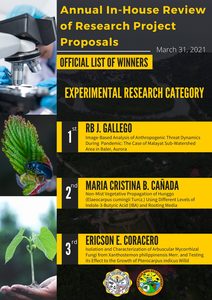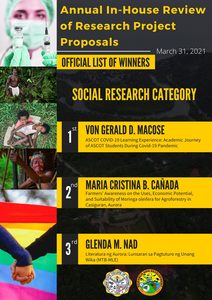

Despite the restrictions brought about by the COVID 19 Pandemic, the Aurora State College of Technology (ASCOT), through its Research and Development Services Office (RDSO), held its Annual ASCOT In-House Review of Research Proposals via Zoom, March 31.
Under the Social Research Category, the research proposal proposed by the College’s Students Affairs Services Director; Mr. Von Gerald D. Macose entitled “ASCOT COVID-19 Learning Experience: Academic Journey of ASCOT Students,” won first place, the proposal entitled “Farmers’ Awareness on the Uses, Economic Potential, and Suitability of Moringa oleifera for Agroforestry in Casiguran, Aurora” by the College Extension Office Director; Mrs. Maria Christina Cañada bagged the second place; and the proposed research entitled “Literatura ng Aurora: Lunsaran sa Pagtuturo ng Unang Wika (MTB-MLE)” by ASCOT’s Sentro ng Wika at Kultura’s Director; Ms. Glenda M. Nad got the third spot in the said category.
On the other hand, in the Experimental Research Category, Graduate Studies Director Dr. RB J. Gallego’s research proposal entitled “Image-Based Analysis of Anthropogenic Threat Dynamics During Pandemic: The Case of Malayat Sub-Watershed Area in Baler, Aurora” won first place, the proposal entitled “Non-Mist Vegetative Propagation of Hunggo (Elaeocarpus cumingii Turcz.) Using Different Levels of Indole-3-Butyric Acid (IBA) and Rooting Media” by Mrs. Cañada got the second place; and the proposed research entitled “Isolation and Characterization of Arbuscular Mycorrhizal Fungi from Xanthostemon philippinensis Merr. and Testing its Effect to the Growth of Pterocarpus indicus Willd.” of Mr. Ericson E. Coracero, Forestry Instructor got the third place in the said category.
Two separate Boards of Evaluators evaluated the entries in each category.
Under the social research category, the board was composed of Dr. Johanna D. Acallar and Dr. Maria Teresa S. Valdez.
Meanwhile, Dr. Yolina T. Castañeto, Dr. Darwin E. Totaan, and Dr. Marvin M. Cinense served as evaluators under the experimental research category.
The essential points considered in selecting the top three best research papers include creativity, originality, and quality of work; the significance of the study; proposal write-up; and oral presentation.
Dr. Acallar, one of the evaluators during the said review, expressed her admiration to the faculty members and staff of the College for being dedicated to proposing various researches that will largely contribute to the increase of knowledge and for the whole community.
She also said that activities like this prove that the College emphasizes the conduct of research that will help its faculty members grow professionally in their respective fields.
A total of twenty-five research proposals from various disciplines were presented, wherein eighteen were evaluated under the Social Category, and seven under the experimental category were presented in the said In-House Review.
